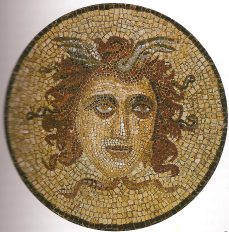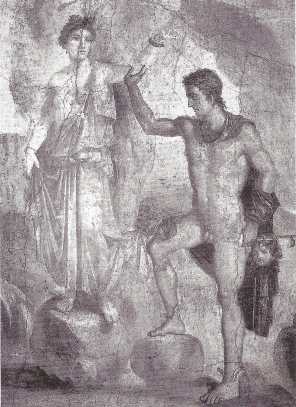Perseus, the hero who killed the monstrous Medusa
Could there be a hero more virtuous than Perseus? A model of chivalry, he rescued his future bride, Andromeda, from a monster and his mother from a powerful king. A brave and resourceful adventurer, he ranks among the greatest monster-slayers of greek mythology. A paragon of fidelity, the hero remained true to Andromeda throughout their marriage. A beloved king, he not only ruled Tiryns for many years, but founded the neighboring city of Mycenae and fortified Midea as well. Little wonder then, that Homer called him "the most renowned of all men".
The expedition to capture Medusa Conception, Birth and YouthThe story of Perseus actually begins two generations earlier. His grandfather, Acrisius, king of Argos, had a twin brother named Proetus.The two brothers were supposed to grow up to rule Argos together. But as soon as they reached manhood, they fought for the throne of Argos. In this battle, Acrisius was the winner and forced his brother into exile. Proetus then became the king of Tiryns, a neighboring city in Argolis -the region surrounding Argos. After many years of marriage to Aganippe, Acrisius had no male heir; instead he had an only daughter named Danae. Wanting a son to inherit his kingdom, Acrisius consulted an oracle, but to his disappointment got some bad news: He learned that not only he would he have no sons, but that his daughter's son would kill him. In an act of desperation, Acrisius tried to prevent the fulfillment of the prophecy, by locking his daughter up in an underground chamber. Despite these measures, Danae conceived a child by Zeus. The god fell in love with Danae and appeared before her in the form of a gold shower, which poured through the roof of her cell and fell onto her. Thus Danae gave birth to a child, whom she called Perseus. When Acrisius found out about the birth of the child, he acted quickly: He placed both Danae and the baby into a large wooden chest and cast it into the Aegean Sea , convicting his daughter and her son to death. Fortunately, Zeus guided the chest across the sea to the island of Seriphus. On this island, there lived two brothers: One was Polydectes (meaning "All Receiver"), king of Seriphus and the other was Dictys (meaning "Net Man") who was a poor fisher. These two brothers were not at all on good terms with each other. The chest that contained the two runaways was caught one day in the net of Dictys. After rescuing and releasing them, Dictys took the two refugees into his home, claiming that they were distant relatives. Dictys cared for Danae and her son for many years, until the hero reached manhood. The expedition to capture Medusa After a while, Polydectes announced his intention to ask for the hand of Hippodameia, a daughter of king Oenomaus of Pisa, a city in southwestern Greece. Polydectes arranged for a banquet, in which each invited guest must traditionally bring a gift for the intended bride. Polydectes demanded that each of his subjects bring a horse as a contribution. Perseus, having not the means to acquire a horse, was in a difficult position. He thus offered to bring to the king whatever else he desired, even the head of Medusa. Polydectes, knowing very well that this was an impossible feat, was very happy to accept the hero's offering. Medusa was one of three monstrous sisters called the Gorgons. Of the three, only Medusa could be killed; her sisters Euryale and Stheno were immortal. The hideous Gorgons had the following features:
In order for Medusa's slayer to be successful, he must approach her lair without being seen either by her or her sisters. To avoid being turned to stone, the killer would have to slay her without looking at her. Finally, even after being successful in killing Medusa, the slayer would then need to flee with incredible speed so as to avoid the swift pursuit of her winged sisters. To Perseus's great comfort, goddess Athena, who hated Medusa, offered to help him accomplish this terrible feat. She appeared before him and gave him directions exactly what to do. She first took him to a cave in Seriphus where some of the Naiads lived. These nymphs lent to the hero everything he should need to be triumphant:
God Hermes then appeared and gave Perseus a sword of adamant-a metallic stone so hard that it was almost unbreakable. In order to find out about directions to the Gorgon's lair, Perseus traveled to a cave in the mountain where Atlas stood. In this cave lived the Graeae ("gray women"), sisters of the Gorgons. These witches, who shared just one eye and one tooth among them, had gray hair from birth. Managing to intercept their only eye when they were asleep, the hero forced the witches to reveal the location of their sisters's lair. After getting the information he needed, he tossed the eye into lake Tritonis and hurried to his destination. The lair was at the end of the earth, where neither the sun nor the moon ever shone. As he approached and entered the lair, the hero passed dozens of stone figures: the petrified bodies of people who fell victims to the Gorgon's hideous looks. Following Athena's directions, Perseus used his mirrored shield to reflect Medusa's image and direct his attack. He swiftly cut off her head with a single blow from his mighty sword, stuffed her head into the pouch and flew away on his winged feet. Since he was wearing his helmet of darkness which made him invisible, Medusa's sisters could not see their attacker, and thus escaped their vengeance. The Voyage HomeAccording to Ovid alone, the hero first stopped in the land of Hesperides. He announced himself as a son of Zeus and asked the Titan Atlas, who ruled the Hesperides, if he could rest there for a while.Atlas recalled the prophecy of the Titaness Themis, who had warned him that a son of Zeus would one day steal the Golden Apples of the Hesperides. So the Titan, insulted Perseus, denied his godly descent and rudely attempted to expel him from the land. Being cunning and shrewd and knowing that Medusa's head still had the power to turn its beholder into stone, the hero before leaving, made an offer to the Titan to have a look at what he had in the pouch. After accepting his offer, Perseus lifted the head of Medusa, so that Atlas could have a glance. He was thus turned into mountain, later known as Mount Atlas. The Rescue of AndromedaAs Perseus flew on winged sandals over the coast of Ethiopia, he saw the figure of a beautiful woman chained to a rock below. Enchanted, he descended to have a closer look.After gentle persuasion, the girl shared with the hero her tragic tale:Her name was Andromeda and she was the daughter of Cepheus, the king of Ethiopia, and Cassiopeia. Her mother had angered the sea god Poseidon, when she boasted that she was more beautiful than the Nereids, the sea nymphs who served as the god's attendants. To punish Cassiopeia's vanity, Poseidon had flooded the kingdom and sent a sea monster to ravage Ethiopia. Following the advice of an oracle, the king had chained Andromeda to a rocky cliff as a sacrificial offering to appease Poseidon and save his kingdom. The hero immediately fell in love with Andromeda. When she begged for his help, he promised he would, after securing a promise from her father the king that, if he rescued his daughter, he would reward him with Andromeda's hand in marriage and a kingdom. Cepheus eagerly accepted his demand. After killing the monstrous beast, Perseus freed Andromeda, brought her to her parents and demanded his reward. However, a complication emerged: Cepheus, in his eagerness to save Andromeda, forgot his earlier promise to his brother Phineus that he would give Andromeda to him, as a bride to be married. In the battle that ensued when Phineus crashed the couple's wedding demanding the bride to be given to him, Perseus emerged victorious, when he used Medusa's head to turn all of the army of Phineus into stone. With Phineus out of the way, the hero married Andromeda and -unlike most of the gods and heroes of greek mythology-remained faithful to her for the rest of his life. The couple remained with Andromeda's parents for almost a year after their marriage, Andromeda giving birth to their first son, Perses. When Perseus finally resumed his journey back to Seriphus, he and Andromeda left the infant Perses with his grandparents. Since Cepheus had no other heir, Perses inherited his kingdom. The boy's descendants would travel east and rule Persia, the land that was named after Perses. Seriphus RevisitedWhen he returned to Seriphus, Perseus found out that his mother Danae found refuge at the alter of the gods, where Dictys put her in order to escape the assault by Polydectes.The hero then immediately sought to meet with Polydectes to seek revenge for his mother. When he met him, he was provoked by him when he doubted that Perseus had brought back with him the head of Medusa. Being careful to look the other way, the hero lifted the hideous head from the pouch, thus turning Polydectes and all his attendants into stone. Having rescued his mother, Perseus rewarded Dictys for his loyalty by giving him the throne of Seriphus vacated by his brother. He then returned the borrowed weapons to Hermes, who carried them back to the Naiads. In addition, to show his gratitude to Athena, he mounted his trophy, the head of Medusa, on the shield of the goddess. The head, surrounded by snakes' heads on the center of her aegis, became Athena's most distinctive emblem. His heroic quest completed, Perseus set out for Argos with Andromeda and Danae. There, in the kingdom of his birth, he hoped to make peace with his grandfather, Acrisius. Fulfillment of the ProphecyFearing that his daughter and her son would soon return to Argos thus fulfilling the prophecy he so much dreaded, Acrisius fled to Larissa, a kingdom in Thessaly. But Perseus, having long forsaken his grandfather for his cruelty in the past, followed him to Larissa.While attending funeral games held in honor of the father of king of Larissa who had recently died, Perseus decided to join the discus-throw competition. Unfortunately, a discus thrown by Perseus got away from him, accidentally striking and killing one of the spectators, who was no other than Acrisius. The prophecy was thus, after so many years, fulfilled. With the death of Acrisius, Perseus inherited the throne of Argos. Yet he felt so ashamed about killing his own grandfather that he vowed never to return to Argos. Instead, he resorted into trading kingdoms (Argos for Tiryns) with Megapenthes, the only son of Acrisius's twin brother Proteus. Perseus served as king of Tiryns for many years after. While ruling Tiryns, he established the city of Mycenae and fortified Midea. He remained faithful to Andromeda, who bore him six children. After his death, Perseus was worshipped both in Athens and Seriphus as a great hero. Athena herself honored both Perseus and Andromeda by making constellations in both their names, after they died.
Return from Perseus to Mythical Heroes
|
||
Resource MaterialClassroom MaterialMovies,DVDs, Games and BooksAbout the SiteYour Stories |
||
|
|
||







